Living and Learning – drug education
This week, we have been learning about medicines and how it is important to tell a trusted adult if we feel unwell so that they can help us to get the help we need to feel healthy and well again. We talked about how we should only use medicines with the help of a trusted adult.
The children worked in groups to read scenarios and suggest what will help the characters to feel better.

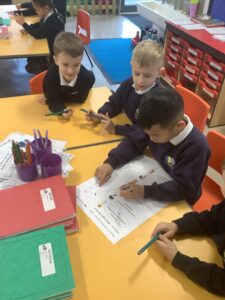
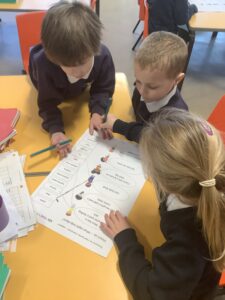
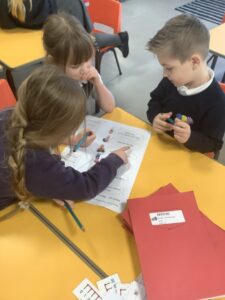
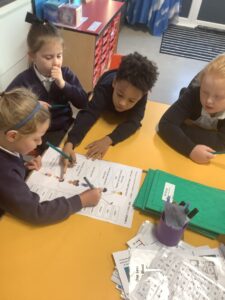
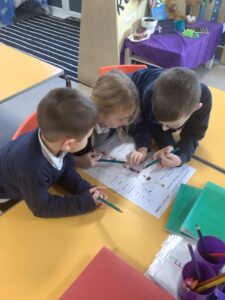
After, we thought of people who help us to stay healthy and well and how they do this.
“The doctors and nurses. They might take our temperature and ask us how we are feeling and sometimes they give us medicine”.
“Our grown ups, they might give us a cuddle to make us feel better”.
Challenge: Can you name one thing that can help someone feel better?
Living and Learning: drug education
Recently, in our Living and Learning sessions, we’ve been thinking about drug education.
‘Some drugs can be harmful’.
‘Some drugs can help us get better when we are unwell’.
We’ve been developing our understanding of the drugs that can help us get better. Usually, they are called medicines and we would receive them from a doctor or a chemist. Even though they are drugs to make us feel better, we know we must be safe and let an adult help. There are also some medicines which we don’t need from a doctor, such as sleep or rest.

‘They should go to the doctor to get some eardrops’.
‘A trusted adult should help them take the eardrops’.

‘They should have some Calpol from an adult and go to the doctor if it gets worse’.
‘They need to rest’.

‘They won’t need to go to the doctor but they can put a plaster on it’.
‘Wash their hands’.
Super maths stars!
Year 1 are maths superstars!
In September, we completed a maths challenge to see how many numbers the children could write up to 100. Today, we re-completed that challenge.
Every child in the class has made progress! Well done, Year 1.
Here are a few examples to show you the progress that they have made.

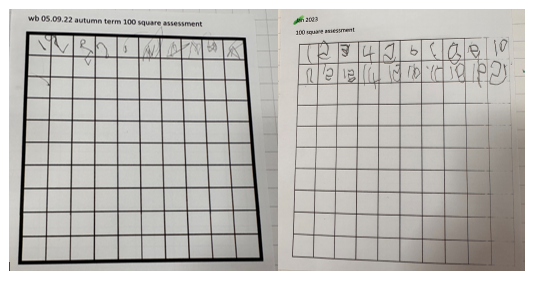
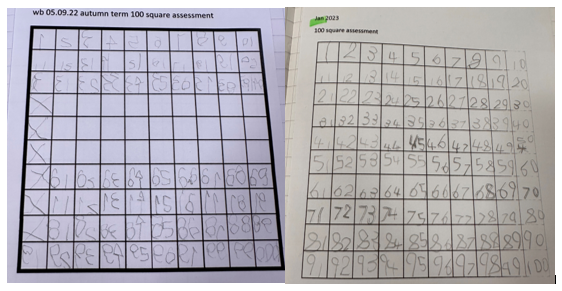
Help at home: keep practicing reading and writing numbers and log in to Numbots to practice their number fluency skills.
Writing: nouns and adjectives
In our English lesson today, we recapped our knowledge of nouns and adjectives to write about the illustrations in our new class novel Here We Are by Oliver Jeffers.
A noun is a thing, place or person.
An adjective gives information about the noun.
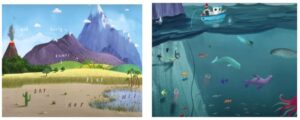
We wrote about these two illustrations. See some of our exciting sentences and expanded noun phrases below!
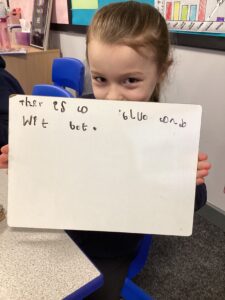
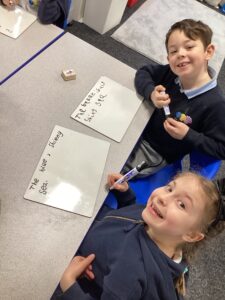
Help at home: do you have a book that contains some beautiful illustrations? Use nouns and adjectives to describe the characters or places that you can see in your book. You could write them in your homework books and bring them in to show me!
Living and Learning: I know what a drug is
Our current Living and Learning is all about staying safe and we start the new year with drug education.
- I know what a drug is.
- I know that some drugs are harmful.
This week, we focus on the reasons why we use household products and medicines and the importance of using them safely. The children explored a range of medicine labels and instructions and assessed some potential hazards and risks.
In today’s lesson, we looked at empty medicine packaging with partners. The aim was to find the all the information someone would need before taking the medicine, and how they were labelled.
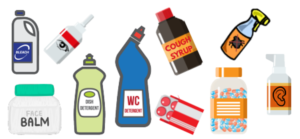
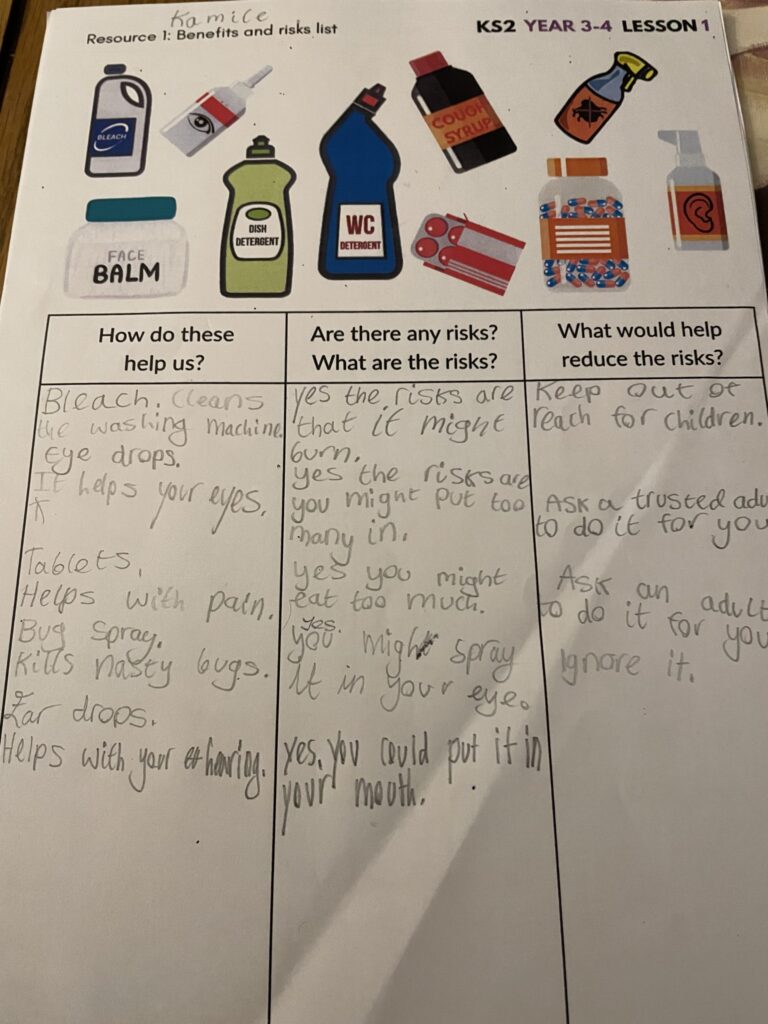
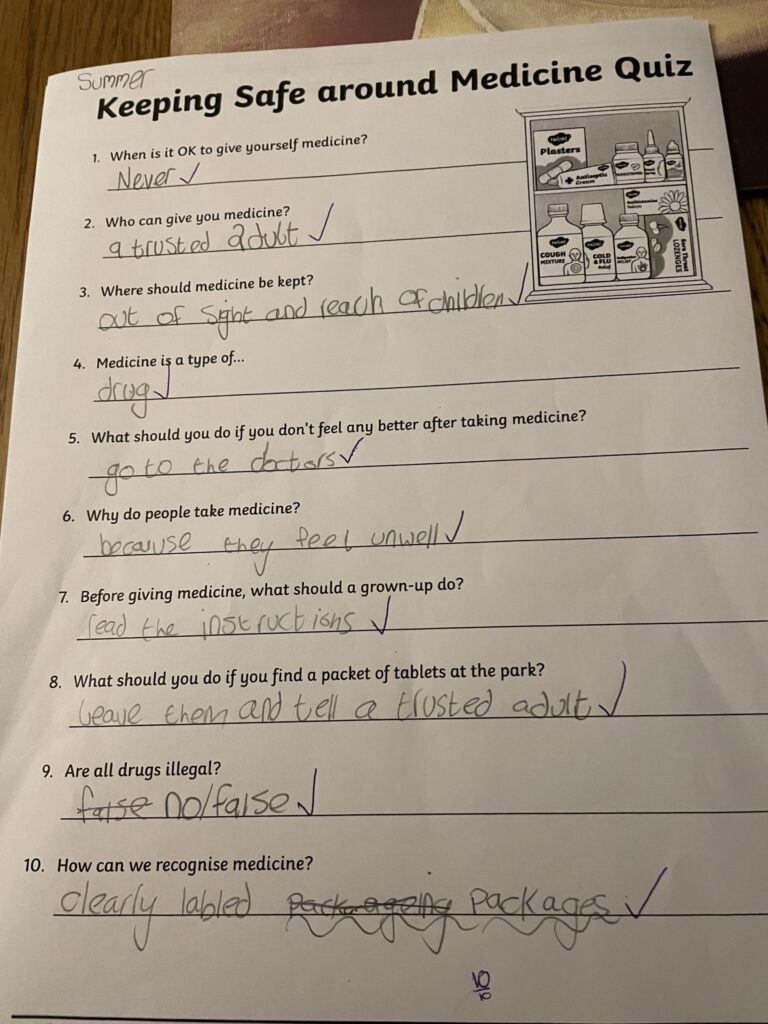
Help at home by talking to your child about medicines – they’re helpful drugs, but only when used by the right people in the right way. Older children can develop this understanding in terms of other drugs like alcohol – talk about age restrictions and drinking in moderation.
Science: Physics (Earth and Space)
This half-term, Years 5 and 6 are going to learn as physicists, as we are learning about Earth and Space.
Our goal is to learn as much as possible around the following areas:
Planets and the Sun
- What are the planets in our Solar System?
- Can we order them from closest to furthest away from the Sun?
- How long does it take each planet to orbit the Sun – why is this?
- Can we give some knowledge about each planet?
- Are the sizes of the planets/distances between the planets the same?
- How many stars are in our Solar System?
Earth and the Moon
- How does the Earth move in relation to the Sun and the Moon?
- How and why do we experience day-time and night-time?
- Where do months come from? Why are they this long?
- What is the moon and why can we only see it during night-time?
- How do time-zones in different countries link to the movement of the Earth?
Famous physicians/theories
- Who was Nicolaus Copernicus and what theory did he believe about our Solar System?
- How did Galileo Galilei support the same theory?
- Why did people previously believe the Earth was flat? How was this disproven?
- Which is the correct, scientifically proven model of our Solar System: the geocentric or the heliocentric model?
Help at Home
Below is our vocabulary for this half-term. Take time to read and aid understanding of each concept with your child.
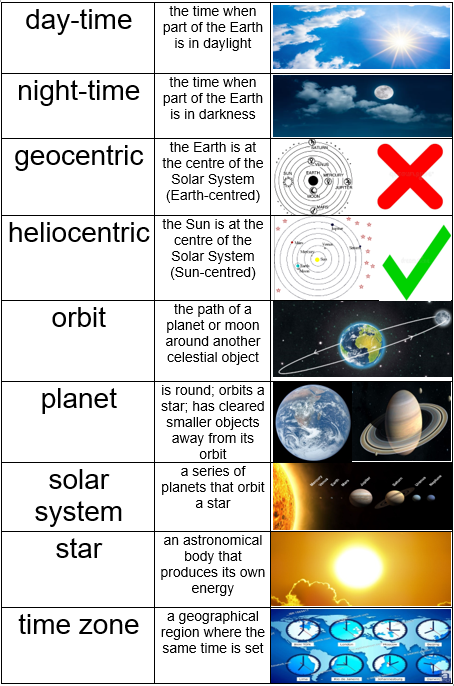
Welcome back!
Hello!
I hope you all had a fantastic Christmas break and are looking forward to an amazing 2023. I would like to take this opportunity to say thank you for all of our lovely Christmas cards and gifts.
This week our focus book has been Lost and Found. We have used this to think about the weather in different places around the world and how different animals live in different places. Whilst outside we discovered some signs of Winter. We discussed how we thought the ice got there and what would need to happen for it to change into water.
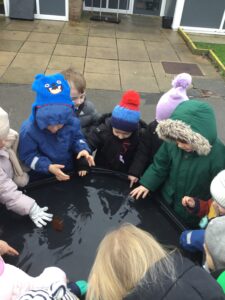
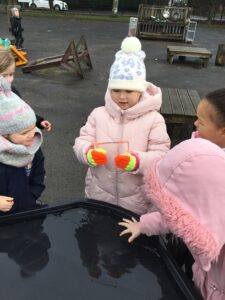
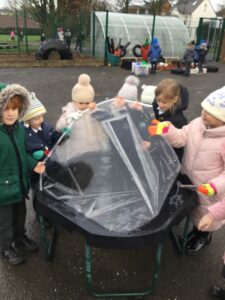
As we read through our story we decided that we would like to make some of our own penguins. We used a range of different materials to create different parts of the penguins.
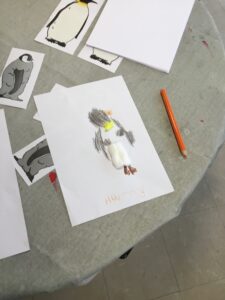
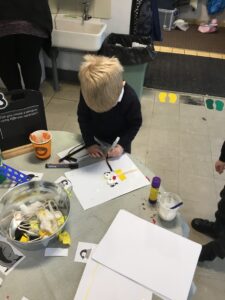
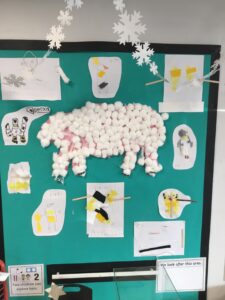
The more we read about the penguin in the story the more we wanted to learn. Harry asked “how tall is a penguin in real life?” we decided to find out and create our own real life sized penguins. We created an Emperor, Rockhopper and Macaroni penguin. Can you believe an Emperor penguin can be 115cm tall! We then used our real life sized penguins to find out if we were taller or shorter than the different penguins.
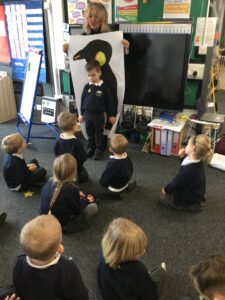
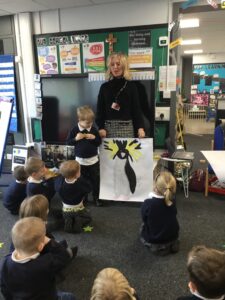

On Monday 16 January 9- 9:30 we will be holding our next stay and play session. This time we will be focusing on phase 3 phonics.
Things you could do to help with learning at home:
- letter formation
- blending sounds
- talking about things in the local environment.
Mrs Payne
Topic
Happy New Year! As you may already know, our new Topic is all about Geography. We are learning about ‘The streets around our school’.
Today, we learned about human and physical features of the environment. A human feature is something man-made, built by a human. A physical feature is a natural part of our world. We went on a walk around the school grounds to look.
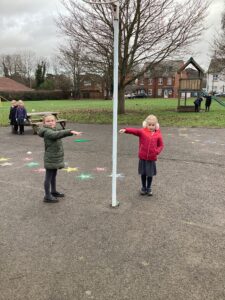
Some human features.
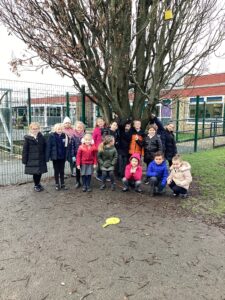
A physical feature.
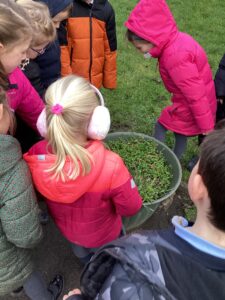
We found some plants and discussed if they would be a human or physical feature.
‘They might be a human feature because a person would have had to plant it.’
‘It is part of nature so it could be a physical feature.’
Our learning also links to our RE topic – how can we look after our planet? We spent some time today discussing our favourite features of the school and whether they were physical or human features.
Help at home: look out for and discuss human and physical features on your way to school. Talk about which features you like and why.
Topic – Geography
This half term our topic is Geography. We’re all excited to become Geographers. Geographers are a type of scientist who studies the Earth. Geographers study the land (the physical features of the Earth) and the people who live within it (the human features).
This week, we’ve started by looking at an aerial map of our school, naming the four countries that make up the UK and their capital cities and listing some human and physical features in our environment.


We have enjoyed watching a video to help us to remember the 4 countries that make up the UK and their capital cities. (This is a YouTube link. Top tip for watching YouTube with your child: go to the settings cog along the play bar and turn off autoplay – this avoids an inappropriate clip coming up automatically, and helps to discourage your child from passively watching clip after clip.)



We have also start to look at our Geography vocabulary, which you can see below.

Challenge: Can your child name the 4 countries that make up the UK and name their capital city?
Science Rocks!
Science in Year 3 and 4 will quite literally rock this half term! Our new topic is rocks, soils and minerals.
In this week’s science lesson, we grouped (sorted) a variety of rocks based on their characteristics and physical properties. We have become familiar with using a Venn Diagram and this allowed us to identify different ways to sort the rocks.
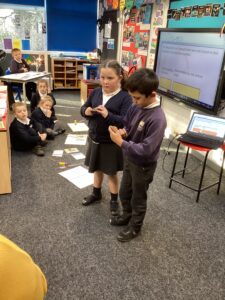
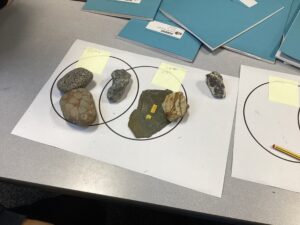
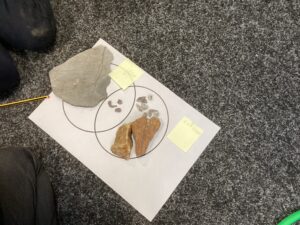
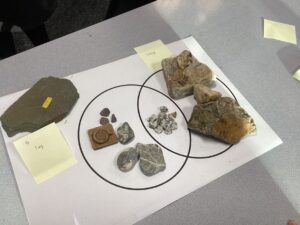
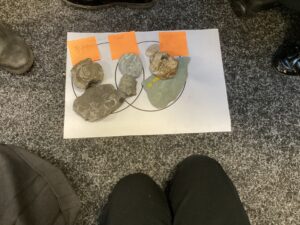
Why not ask your child about their observations of rocks? It would also be great to ask them if they can recall any of our new science vocabulary for this term.